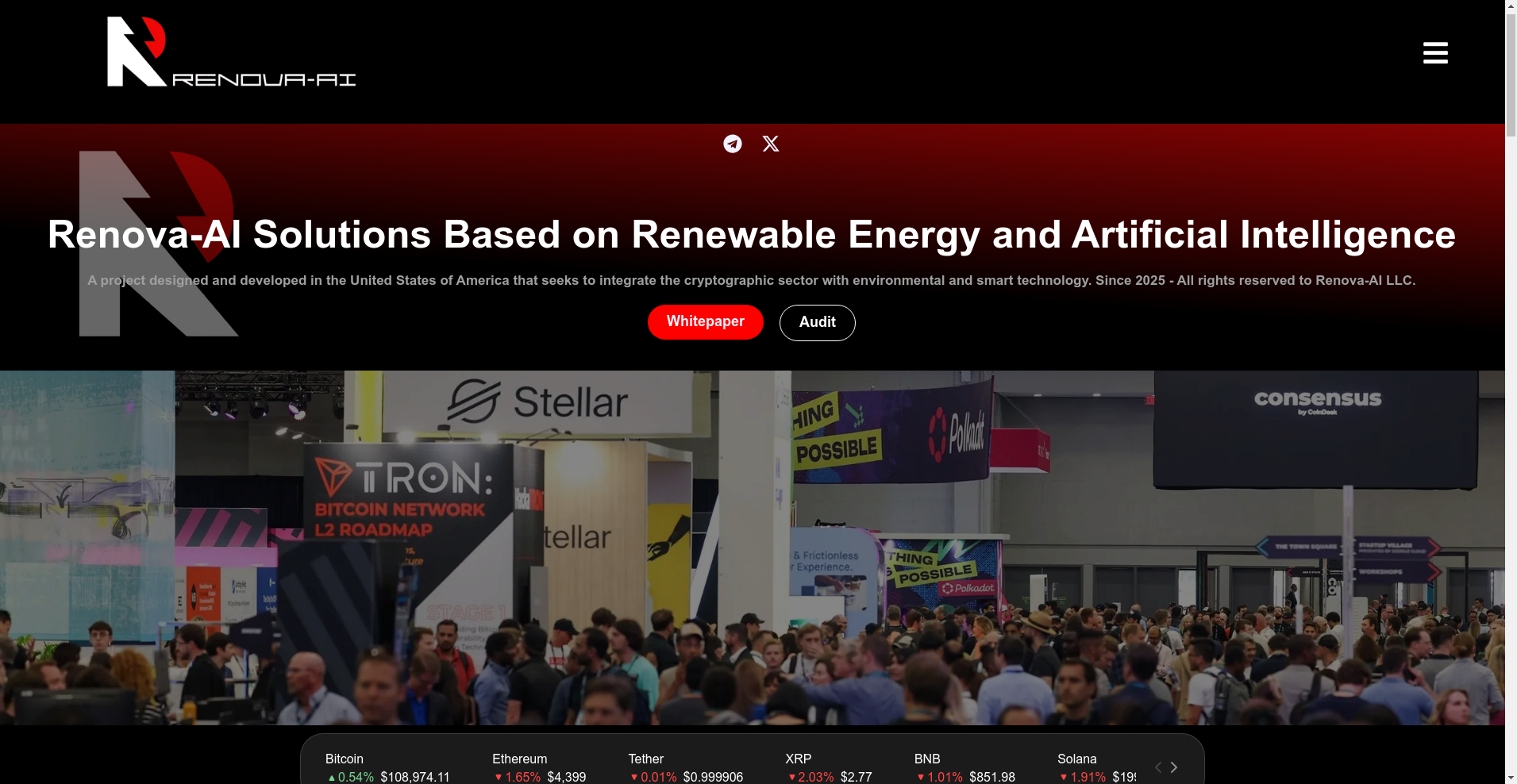Renova-AI ($RVA) Review: A Data-Driven Assessment of Its Legitimacy and Risks

What Is Renova-AI: An Introduction
Renova-AI is a relatively new project that claims to merge the worlds of renewable energy, artificial intelligence, and blockchain technology. Marketed as a solution-oriented ecosystem, it emphasizes environmental sustainability alongside innovative crypto products such as ecological mining, a high-speed blockchain network, and AI-driven smart contracts. The project positions itself as a forward-thinking platform aiming to bridge traditional energy sectors with cutting-edge cryptographic solutions.
This review offers an impartial analysis of Renova-AI, focusing on its technological claims, developmental progress, security posture, and tokenomics. Given the complexity and the emerging nature of the project, our goal is to dissect the available data objectively, highlighting both strengths and potential red flags based solely on verified information and credible audit reports.
The Team and Vision Behind Renova-AI
The publicly available team information appears limited, with only two key figures explicitly named: Liam C, serving as CEO, and Charles M, listed as Co-Founder. There are no detailed bios, prior experience disclosures, or affiliations beyond this. The absence of extensive team transparency raises questions about the project's centralized control and governance processes. Assessing the impact of team transparency is crucial for any crypto venture.
The roadmap announced in various communications outlines ambitious milestones across 2025, including the launch of a proprietary blockchain network, ecological mining operations powered by renewable energy, and integrations with tier-1 centralized exchanges. These objectives suggest a strategic vision aimed at scalability and high-performance, but the feasibility depends heavily on the team’s capacity to deliver on technological and operational promises.
- Q1 2025: Platform development, initial community growth, high-security audit, and early exchange listings
- Q2 2025: Further exchange integrations, token burning to reduce supply, and price stabilization efforts
- Q3 2025: Mainnet launch, ecological mining operations, and AI contract development tools
Overall, while the roadmap signals clear goals, the limited team transparency and the lack of detailed experience documentation warrant cautious optimism regarding their ability to meet these targets.
Assessing the Security and Integrity of Renova-AI
Our security analysis is primarily based on the audit report obtained from Cyberscope, which is noted as the only available major auditing source. The audit assigns a "Safety Score 100%", with no immediate vulnerabilities reported. The project claims that it has been audited and approved by BlockSafu, enhancing its credibility from a security standpoint.
Key findings from the Cyberscope audit include:
- Complete audit scope for token contracts, with assessments indicating high security standards.
- No critical vulnerabilities found; the project maintains a high security score (90%-100%) over multiple check-ins.
- Centralization concerns: An approximate decentralization score of 51.2% suggests moderate distribution of power, but details are limited.
- Audit transparency: The report is publicly available, but the audit's depth and rigor depend on the auditing firm's methodologies. A deeper dive into evaluating smart contract audit reliability is essential.
While a positive audit outcome is encouraging, it is crucial to note that a single audit source cannot comprehensively verify the security of the entire platform, especially given the multiple complex components like cross-network bridges, decentralized exchange modules, and AI contract generators. Investors should remain cautious and seek additional independent audits in the future.
A Breakdown of Renova-AI Tokenomics
The tokenomics, as listed on the project’s website, currently display placeholders rather than definitive figures. For instance, the total supply is marked as “0M”, with presale, listing, marketing, and reserve allocations all noted as 0%. This anomaly suggests that either the tokenomics are not finalized or the data does not reflect the actual figures.
Nevertheless, the intended token model appears to encompass the following components:
- Total Supply: Placeholder shows “0M”, but a comprehensive tokenomics review would expect a finite cap, potentially in the hundreds of millions or billions depending on the ecosystem’s design.
- Distribution Breakdown:
- Presale: 0% (indicating no current presale or placeholder placeholder)
- Exchange listings: 0%
- Team allocation: 0%
- Development reserve: 0%
- Marketing reserve: 0%
- Vesting and Lock-up: No data available; typically critical to minimize inflation and pump-and-dump dynamics.
- Use Cases: Described as utility tokens enabling cross-network trading, staking, and ecosystem participation — but exact utility mechanisms are not concretely detailed in available materials.
Given these placeholder figures, the actual economic sustainability, inflationary pressures, or governance mechanisms remain uncertain. Investors should demand detailed, binding tokenomics from official disclosures before considering economic viability or exposure to token value fluctuations.
Assessing Renova-AI's Development and Ecosystem Activity
The project’s development activity, as inferred from update logs and project announcements, suggests ongoing work aimed at fintech integrations, product launches, and network upgrades. The presence of a whitepaper and recent audit reports indicates engagement with standard security and development practices.
However, there is limited on-chain activity data, such as liquidity pools, trading volumes, or active users, which are essential for evaluating real-world traction. The fact that the project’s trading volume is currently listed as zero indicates it might still be in pre-launch or early stages, with adoption yet to gain momentum. Furthermore, the lack of community engagement can be a significant warning sign, as analyzed in articles about community disengagement in crypto.
Moreover, official claims of future product releases, such as the RVA exchange app and AI contract generator, are noted as “Download Soon” — implying development is ongoing but not yet available. Without active market participation or partnerships, it is difficult to gauge genuine ecosystem growth beyond marketing statements.
In sum, current activity appears primarily developmental and promotional rather than evidence of strong decentralized adoption or liquidity. Future updates should be monitored for signs of real engagement.
What Investors Should Know About Renova-AI’s Legal and Compliance Framework
The project states that it is registered in Florida as Renova-AI LLC and emphasizes compliance with formal audits and US registration processes. They claim a formal audit through BlockSafu and highlight the security certification as part of their credibility. These claims, if verified, lend some legitimacy to the project’s legal foundation.
There are no indications of ongoing regulatory disputes or suspicious clauses in their terms. Nonetheless, the lack of specific legal disclaimers, investor protections, or detailed governance frameworks warrants caution. The presentation of legal claims appears to be part marketing, which emphasizes security and legitimacy but must be substantiated through actual registration documents and regular compliance disclosures.
Final Analysis: The Investment Case for Renova-AI
Based on the presented data, Renova-AI emerges as an ambitious project aiming to mesh renewable energy, AI, and blockchain into a comprehensive ecosystem. Its security posture looks promising thanks to a favorable audit, and its roadmap illustrates clear developmental milestones. However, significant red flags persist, primarily the placeholder tokenomics details and limited transparency around team experience and real-world activity.
From a risk perspective, investors should be aware that the project is still in early stages, with no available liquidity or trading volume data. The actual economic model's specifics remain unclear, and the authenticity of its claims regarding alliances and regulatory status requires independent verification. Projects with unaddressed security issues or hidden backdoors in smart contracts pose significant risks.
Pros / Strengths
- Positive security audit score (100%), indicating robust technical evaluation
- Clear roadmap with earned milestones expected in 2025, demonstrating strategic planning
- Claims of US registration and formal audits, adding credibility
- Environmental focus highlighting ecological mining and renewable energy integration, aligning with global sustainability trends
Cons / Risks
- Tokenomics are not finalized or transparently disclosed, raising concerns about economic sustainability
- Limited team transparency, which complicates assessment of execution capability
- Lack of on-chain activity and trading volume, indicating low current relevance or adoption
- Potential over-optimism in the roadmap versus tangible progress, requiring cautious tracking
- Heavy reliance on marketing language without substantial independent verification, a common feature in early-stage projects
In conclusion, while Renova-AI presents an intriguing blend of environmental themes with innovative crypto concepts, its current fundamentals suggest it remains in the early development phase with considerable uncertainties. Prospective investors should seek further due diligence, including detailed whitepapers, verified tokenomics, and ongoing security audits, before considering exposure. Staying cautious and scrutinizing on-chain activity and community engagement will be key to understanding its long-term legitimacy and potential rewards.

Jessica Taylor
NFT Market Data Scientist
Data scientist specializing in the NFT market. I analyze on-chain data to detect wash trading, bot activity, and other manipulations that are invisible to the naked eye.
Similar Projects
-
Empowa
Comprehensive Empowa Review: Is This Crypto Project a Scam or Legit? | Crypto Scam Checker & Review
-
DecaWin
DecaWin Review: Crypto Project Scam Checker & Red Flags Analysis
-
BinkeGame
BinkeGame ($BINK) Review: An In-Depth Analysis of Its Disappearance
-
CACHE Gold
CACHE Gold ($CGT) Review: Legitimacy & Risks of Gold Tokenization